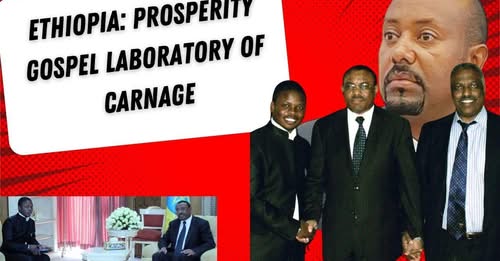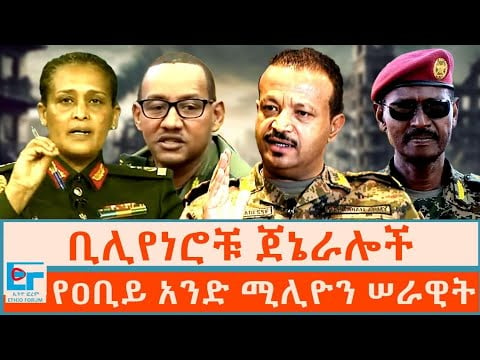 At the heart of East Africa, stands Ethiopia, a nation with a long and resilient history, currently struggling with an escalating crisis. The tension between the Oromo nationalists and the prosperity gospel theocratic government takes center stage in this conflict, presenting a real menace to the country’s stability and progress. This battle for power, deeply rooted in ethnic and religious divisions, is emblematic of wider disparities sweeping across the Horn of Africa. The overall stability of not only Ethiopia but also its neighboring countries is at stake. In this article, we delve into the intricate dynamics of this conflict, offering a detailed, unbiased analysis of the ongoing peril Ethiopia is facing. From examining the origins of these tensions to exploring possible solutions, we will present an in-depth look into the Ethiopia we see today — a nation under threat, yet one filled with hope and potential.
At the heart of East Africa, stands Ethiopia, a nation with a long and resilient history, currently struggling with an escalating crisis. The tension between the Oromo nationalists and the prosperity gospel theocratic government takes center stage in this conflict, presenting a real menace to the country’s stability and progress. This battle for power, deeply rooted in ethnic and religious divisions, is emblematic of wider disparities sweeping across the Horn of Africa. The overall stability of not only Ethiopia but also its neighboring countries is at stake. In this article, we delve into the intricate dynamics of this conflict, offering a detailed, unbiased analysis of the ongoing peril Ethiopia is facing. From examining the origins of these tensions to exploring possible solutions, we will present an in-depth look into the Ethiopia we see today — a nation under threat, yet one filled with hope and potential.
Oromo Nationalist Movement: Historical Background
The Oromo Nationalist Movement represents a vivid chapter in Ethiopia’s historical narrative. Much like other nationalist movements, it too, was born out of the struggle against oppression and the fight for self-identity and expression.
Roots of the Oromo Nationalist Movement
The seeds of the Oromo nationalist movement were sowed during the late 19th century, when the Oromo people, one of the largest ethnic groups in Ethiopia, began to resist imperial rule and discrimination. The Oromo people had their unique culture, language, and societal structures, which often lay in stark contrast to those of the prevailing Amhara-dominated government. Their distinct identity became a rallying point, leading to the inception of the Oromo nationalist movement. This struggle for autonomy and respect of their ethnic identity was intensified by the subsequent heavy-handed tactics by successive regimes to stifle Oromo culture and suppress dissent.
Oromo Nationalism and Ethiopian Politics
The Oromo nationalist movement played a crucial role in shaping Ethiopian politics over the decades. It was a significant catalyst in the downfall of the Derg regime in 1991, allowing the Oromo people a representation in national politics for the first time in centuries, through political groups such as the Oromo Liberation Front (OLF). Nevertheless, their political journey was fraught with issues, as successive Ethiopian governments continued to regard Oromo political aspirants with suspicion and fear. Despite the ongoing challenges, Oromo nationalism remains an important force in Ethiopian politics, continuously advocating for the rights and better representation of the Oromo people.
The Rise of the Prosperity Gospel Theocratic Government
The transformation of Ethiopia’s political landscape has seen an unexpected player come to the forefront, the Prosperity Gospel Theocratic Government. Rising from the shadows, this newly formed body has shaped the current national discourse, posing a significant challenge to Ethiopia’s traditional socio-political fabric.
Understanding the Prosperity Gospel Movement
The prosperity gospel movement, with its roots in Pentecostal and Charismatic Christianity, teaches that faith, positive speech, and donations to religious causes will increase one’s material wealth. This “health and wealth” gospel is often attractive to individuals in economically vulnerable positions.
In Ethiopia, the prosperity gospel movement emerged as a response to rampant poverty and widespread inequality. The teachings provided hope and solace to those grappling with socio-economic challenges. The movement gained significant traction, morphing into a political force powerful enough to influence governance.
Experts argue that the prosperity gospel movement appeals to many because it promises tangible rewards in return for faith. However, critics are quick to point out its potential for exploitation, particularly among the poor who are swindled out of their meager resources with promises of miraculous multiplicities of wealth.
Theocracy and Governance in Ethiopia
Ethiopia’s shift from a secular to a theocratic government, with the Prosperity Gospel movement at its core, has altered the nation’s political dynamics. An increasing number of administrative decisions and policies are now hinged on religious doctrines, disrupting the longstanding tradition of separation between church and state.
The Prosperity Gospel Theocratic Government, operating under divine mandate, views socio-political issues through a religious lens. Thus, it impacts significantly on policy outcomes, with potential far-reaching consequences.
Key among these is the government’s handling of the country’s diversity. The religious-based rule alienates substantial non-adherent sections of the population, escalating Ethiopia’s ethnic and social tensions. The Prosperity Gospel Theocratic Government’s hardline stance on non-negotiable Christian principles further exacerbates the strife.
In conclusion, the rise of the Prosperity Gospel Theocratic Government paints a concerning portrait of Ethiopia’s current socio-political landscape. It is a dynamic that warrants further scrutiny, given the potential implications it bears for Ethiopia’s future stability.
Current Challenges Facing Ethiopia
Ethiopia, the Horn of Africa’s most populous nation, is facing a multitude of challenges currently, with political instability and conflict burdening its path forward.
Political Instability and Conflict
Political instability and conflict in Ethiopia trace their roots back to deep-seated ethnic tensions and longstanding disparities between ethnic factions. The Oromo, Ethiopia’s largest ethnic group, have historically felt marginalized and excluded from political power. Recent political reforms have seen increased Oromo representation in the government, but these advances have sparked backlash and violence from other ethnic groups, exacerbating internal strife.
The conflict in the Tigray region also underscores the escalating tensions and turmoil in the country. The Ethiopian government’s military offensive against the Tigray People’s Liberation Front (TPLF) has resulted in widespread international condemnation, a refugee crisis, and a worrying humanitarian situation.
Ethiopia is no longer the beacon of stability as once perceived. Instead, the country has become a hotbed of political unrest with various ethnic factions vying for power, threatening its unity and long-term development.
Social and Economic Impacts
Socially, the ongoing unrest has driven a wedge between different communities, disrupting the social fabric of the country. It has resulted in displacement of people, loss of lives and retaliation attacks deepening divisions among Ethiopians.
Economically, Ethiopia is also feeling the weight of these conflicts. While it has experienced high growth rates in the past decade, the current strife threatens these economic gains. Investor confidence has been shaken because of political uncertainty and insecurity, slowing investment and development projects. Essential infrastructure, such as roads, schools, and health centers, have been destroyed in conflict-affected regions, further debilitating the social services and shattering the economic potential of these regions.
Additionally, the refugee crisis stemming from the Tigray conflict continues to pressure Ethiopia’s resources and governance capabilities.
In conclusion, the current challenges facing Ethiopia go beyond the surface level. Ethiopia’s internal political turmoil and its social and economic impacts are interconnected issues that need thorough and delicate handling to restore stability and progress in the country.
The Ongoing Menace: Analysis and Implications
This section will delve into the tumultuous state of the nation under the influence of both the Oromo nationalist movement and the Prosperity Gospel theocratic government. We will examine their impact on Ethiopia’s national unity and also observe the implications regionally and globally.
Impact on National Unity
The ongoing menace caused by the Oromo nationalist movement and the Prosperity Gospel theocratic government has strained Ethiopia’s national unity. The Oromo Nationalist, advocating for secession from the Ethiopian state, disrupts the vision of unity. Outpourings of ethnocentrism threaten to dismantle the multi-ethnic fabric of Ethiopian society.
On the other hand, the Prosperity Gospel theocratic government, with its religious biases, further exacerbates divisions among a populace that is religiously diverse. The push for a religious-based form of governance by a group intent on enforcing their interpretation of the Prosperity Gospel complicates national unity. These dynamics endanger the framework of unity through diversity that Ethiopia has strived for over the years.
Regional and Global Implications
The implications of this menace extend beyond Ethiopia’s borders. Regionally, the instability in Ethiopia, acting as a destabilizing factor in the Horn of Africa, provokes fears of a ripple effect in neighbouring countries. These concerns are particularly relevant given Ethiopia’s role as {host to the African Union} and its strategic geographical position.
Globally, the situation poses significant challenges involving refugee crises, human rights abuses, and the interruption of global peacekeeping efforts in which Ethiopia plays a considerable role. The ongoing battles may compromise Ethiopia’s position as a leading contributor to United Nations peacekeeping missions.
In conclusion, the ongoing menace presents significant challenges for national unity within Ethiopia and poses severe regional and global implications. Understanding these ramifications is the first step toward formulating effective solutions.
Future Prospects and Possible Solutions
In Ethiopia’s political quagmire, a clear path is needed. As the nation finds itself beset with a multitude of issues, including the Oromo Nationalist movement and the Prosperity Gospel Theocratic Government, we turn our attention to future prospects and potential solutions that can alleviate the ongoing peril.
Dialogue and Reconciliation
Factoring in the complex socio-political climate of Ethiopia, initiating a dialogue and reconciliation process appears to be a cardinal option. The complexity of the conflicts, which are deeply rooted in the historical grievances of the marginalized Oromo people and religious facets, necessitates an inclusive dialogue involving all the concerned parties.
In such a dialogue process, it is essential to fully address the demands and grievances of the Oromo nationalists, while carefully threading around the intricate religious dimensions added by the Prosperity Gospel Theocratic Government. Simultaneously, the differing ideologies and interests of these two major players need to be reconciled to pave the way for a peaceful and stable Ethiopia. Hence, open dialogue, mutual respect, and genuine reconciliation are key to any sustainable solution.
International Influence and Support
As a pivotal player in East Africa, Ethiopia’s instability inevitably impacts regional and even global peace and security. Therefore, the role of international influence and support cannot be understated. International bodies and influential powers can work towards applying diplomatic pressures to bring all the concerned parties to the negotiation table.
In addition, international aid and support should not be limited to addressing immediate humanitarian crises, but should also be channeled into building resilient institutions and fostering democratic governance. This can be achieved by promoting education, enhancing economic opportunities, and strengthening the judicial system to ensure accountability and rule of law.
Conclusively, the resolution to Ethiopia’s predicament lies in a balanced approach that pairs internal dialogue and reconciliation with beneficial international influence and support. The task may seem challenging, but with steady commitment, positive change is achievable. It is hoped that Ethiopia can overcome its crises and reshape itself into a nation of unity, tolerance, and prosperity.


Prosperity Gospel is only a facade and a tool. A facade to fool the west. A tool to lure the unsuspecting Orthodox Christians out of their fold. Prosperity Gospel is a transitional stage, a transient state. The final destination of the sinister Wahhabis (Abiy and Co.) is a Sharia-ruled Islamic State of Oromia.
Sharia and WAHabi is better than Pente or evangelical.